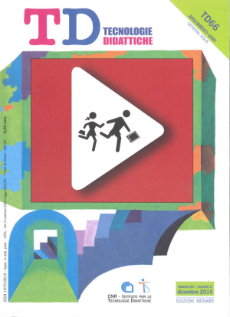Assunzione di ruolo e funzioni conversazionali in un corso universitario "blended"
Contenuto principale dell'articolo
Abstract
Dettagli dell'articolo
Fascicolo
Sezione
Gli autori che pubblicano su questa rivista accettano le seguenti condizioni:
- Gli autori mantengono i diritti sulla loro opera e cedono alla rivista il diritto di prima pubblicazione dell'opera, contemporaneamente licenziata sotto una Licenza Creative Commons CC BY 4.0 Attribution 4.0 International License.
- Gli autori possono aderire ad altri accordi di licenza non esclusiva per la distribuzione della versione dell'opera pubblicata (es. depositarla in un archivio istituzionale o pubblicarla in una monografia), a patto di indicare che la prima pubblicazione è avvenuta su questa rivista.
- Gli autori possono diffondere la loro opera online (es. in repository istituzionali o nel loro sito web) prima e durante il processo di submission, poiché può portare a scambi produttivi e aumentare le citazioni dell'opera pubblicata (Vedi The effect of Open Access).
Riferimenti bibliografici
Beaudoin, M. (2003). Learning or Lurking? Tracking the Invisible on line Student. The Internet and Higher Education, 5, 147-155.
Black E., Dawson, K., & Priem J. (2008). Data for free: Using LMS activity logs to measure community in an online course. Internet and Higher Education, 11(2), 65-70.
Brewer S., & Klein J. (2006). Type of positive interdependence and affiliation motive in an asynchronous, collaborative learning environment. Educational Technology Research & Development, 54(4), 331-354.
Cacciamani, S., Cesareni, D., Martini, F., Ferrini, T., & Fujita, N. (2012). Influence of participation, facilitator styles, and metacognitive reflection on knowledge building in online university courses. Computers and Education, 58(3), 874-884.
Cesareni, D., & Cacciamani, S. (2011). Effects of role taking in on-line writing and reading activities in a blended University course. Paper presented to the XIV Earli conference Education for a Global Networked Society, Exeter UK.
Cesareni, D., & Rossi, F. (2011) Discutere in rete per costruire competenze professionali: costruzione di un sistema di analisi della partecipazione qualitativa alla discussione. III Congresso Nazionale CKBG Empowerment, Formazione e Tecnologie: l’individuo, il gruppo e l’organizzazione, Bari IT. Abstract retrieved from www.ckbg.org/congresso2011/wpcontent/ uploads/2011/04/III_Congresso_CKB G._Libro_degli_Abstract_completo1.pdf
Coldwell, J., Craig, A., Paterson, T., & Mustard, J. (2008). Online Students: Relationships between Participation, Demographics and Academic Performance. The Electronic Journal of e-Learning, 6(1), 19-30. Retrieved from www.ejel.org.
Engeström, Y., & Sannino, A. (2010). Studies of expansive learning: Foundation, findings and future challenges. Educational Research Review, 5, 1-24.
Garrison, D. R., Anderson, T., & Archer, W. (2000). Critical inquiry in a text-based environment: computer conferencing in higher education. The Internet and Higher Education, 2(2-3), 87-105.
Hare, A.P. (1994). Types of roles in small groups: A bit of history and a current perspective. Small Group Research, 25, 443-448.
Kollar, I., Fischer, F., & Hesse, F. W. (2006). Collaboration scripts - a conceptual analysis. Educational Psychology Review, 18(2), 159- 185.
Lancia, F. (2004). Strumenti per l’Analisi dei Testi. Introduzione all’uso di T-LAB. Milano, IT: Franco Angeli.
Ligorio, M. B. (2010). Dialogical relationship between identity and learning. Culture & Psychology, 16(1), 93-107.
Morris, M., & Ogan, C. (1996). The Internet as mass medium. Journal of Computer-Mediated Communication, 1(4). Retrieved from http://jcmc.indiana.edu/vol1/ issue4/morris.html
Muukkonen, H., Hakkarainen, K., & Lakkala, M. (2004). Computer-mediated progressive inquiry in higher education. In T. S. Roberts (Ed.), Online Collaborative Learning: Theory and Practice (pp. 28-53). Hershey, PA, USA: Information Science Publishing.
Nonnecke, B., & Preece, J. (2001). Why lurkers lurk. Paper presented at the Americas Conference on Information Systems. Boston. Retrieved from http://skeeter.socs.uoguelph.ca /~nonnecke//research/whylurk.pdf
Pontecorvo, C., Ajello, A.M., & Zucchermaglio, C. (1991) Discutendo si impara. Interazione sociale e conoscenza a scuola. Roma, IT: Carocci.
Preece, J., Nonnecke, B., & Andrews, D. (2004). The top five reasons for lurking: improving community experience for everyone. Computers in Human Behavior, 20, 201-223.
Scardamalia, M. (2002). Collective cognitive responsibility for the advancement of knowledge. In B. Smith (Ed.), Liberal education in a knowledge society (pp.76-98). Chicago, IL, USA: Open Court.
Scardamalia, M., & Bereiter, C. (2006). Knowledge building: Theory, pedagogy, and technology. In K. Sawyer (Ed.), Cambridge Handbook of the Learning Sciences. New York, NY, USA: Cambridge University Press.
Scardamalia, M., & Bereiter, C. (2010). A brief history of Knowledge Building. Canadian Journal of Learning and Technology 36(1). Retrieved from http://www.cjlt.ca/index.php /cjlt/article/view/574.
Schellens, T., Van Keer, H., De Wever, B., & Valcke, M. (2007). Scripting by assigning roles: Does it improve knowledge construction in asynchronous discussion groups? International Journal of Computer- Supported Collaborative Learning, 2(2/3), 225-246.
Selwyn, N. (2012). I Social Media nell’educazione formale e informale tra potenzialità e realtà. TD Tecnologie didattiche, 20(1), 4-10. Retrieved form http://www.tdjournal.itd.cnr.it /files/pdfarticles/PDF55/Neil_Selwyn.pdf
Spadaro, P. F., Sansone, N., & Ligorio, M.B. (2009). Role-taking for knowledge building in a blended learning course. Je-LKS, 5(3), 11-21.
Strijbos, J.W., Martens, R., Jochems, W.M.G., & Broers, N.J. (2004). The effect of functional roles on group efficiency: Using multilevel modeling and content analysis to investigate computer-supported collaboration in small groups. Small Group Research, 35(2), 195- 229.
Strijbos, J. W., & Weinberger, A. (2010). Emerging and scripted roles in computer-supported collaborative learning. Computers in Human Behavior, 26, 491-494.
Wise, A. F., & Chiu, M. M. (2011) Analyzing temporal patterns of knowledge construction in a role-based online discussion. International Journal of Computer-Supported Collaborative Learning, 6, 445-470.
Wise, A. F., Saghafian, M., & Padmanabhan, P. (2012). Towards more precise design guidance: specifying and testing the functions of assigned student roles in online discussions. Educational Technology Research and Development, 60(1), 55-82.

